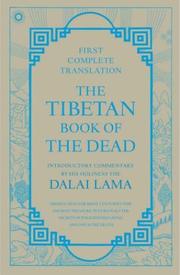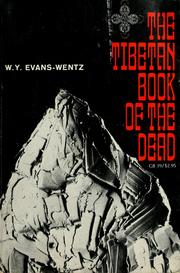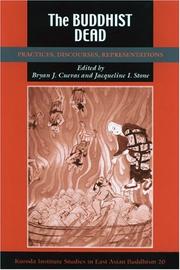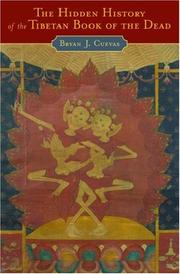| Listing 1 - 6 of 6 |
Sort by
|
Book
ISBN: 9783700167228 3700167229 Year: 2010 Volume: 66 394 Publisher: Wien : Verlag der Österreichischen Akademie der Wissenschaften,
Abstract | Keywords | Export | Availability | Bookmark
 Loading...
Loading...Choose an application
- Reference Manager
- EndNote
- RefWorks (Direct export to RefWorks)
Death --- Mort --- Religious aspects --- Buddhism. --- Aspect religieux --- Bouddhisme --- Buddhism --- Dying --- End of life --- Life --- Terminal care --- Terminally ill --- Thanatology --- Buddhist doctrines --- Buddhist theology --- Lamaist doctrines --- Doctrines --- Religious aspects&delete& --- Philosophy --- Death - Religious aspects - Buddhism


ISBN: 9780713994148 0713994142 Year: 2005 Publisher: London : Penguin books,
Abstract | Keywords | Export | Availability | Bookmark
 Loading...
Loading...Choose an application
- Reference Manager
- EndNote
- RefWorks (Direct export to RefWorks)
Book
ISBN: 2220044025 9782220044026 Year: 1999 Publisher: Paris Desclée de Brouwer
Abstract | Keywords | Export | Availability | Bookmark
 Loading...
Loading...Choose an application
- Reference Manager
- EndNote
- RefWorks (Direct export to RefWorks)
Entre le Christ souffrant et le sourire illuminé de Bouddha, entre le sentiment d'angoisse et l'invitation à la sérénité, les attitudes face à la mort diffèrent, divergent souvent entre les civilisations. Et particulièrement entre le monde chinois et la culture occidentale. Deux intellectuels, Tang Yi Jie et Xavier Le Pichon, ont accepté de confronter leurs vues sur ce thème essentiel de l'existence humaine. Pour le philosophe chinois, la mort est inscrite dès le début de la vie. A partir de son expérience personnelle, il tente de la réinscrire dans les sagesses traditionnelles comme le confucianisme et le taoïsme, à contre-courant du marxisme des dernières décennies. Géophysicien et professeur au Collège de France, Xavier Le Pichon choisit quant à lui de traiter du mystère de la mort dans une perspective chrétienne. A travers l'évocation sensible des derniers moments de ses parents, il partage son espérance dans la résurrection. Mais au-delà de ces deux approches, le souci est le même de rappeler que la mort est tout sauf simple destruction, de célébrer ce qu'elle porte de digne, et, en quelque sorte, de beau.
Death --- Religious aspects --- Buddhism. --- Christianity. --- S12/0242 --- China: Philosophy and Classics--Contemporary Chinese philosophy --- S12/0820 --- China: Philosophy and Classics--Comparative philosophy --- Death - Religious aspects - Buddhism. --- Death - Religious aspects - Christianity.

ISBN: 0195002237 9780195002232 Year: 1960 Volume: 39 Publisher: London Oxford university
Abstract | Keywords | Export | Availability | Bookmark
 Loading...
Loading...Choose an application
- Reference Manager
- EndNote
- RefWorks (Direct export to RefWorks)
294.3*94 --- 294.3*94 Lamaïsme --- Lamaïsme --- S24/0920 --- Tibet--Tibetan Buddhism: sacred texts --- #BIBC:bibl.Cerulus --- #SML: Joseph Spae --- S24/0900 --- Tibet--Religion and philosophy --- Intermediate state --- Death --- Funeral rites and ceremonies, Buddhist --- Buddhism --- Religious aspects --- Intermediate state - Buddhism - Early works to 1800 --- Death - Religious aspects - Buddhism - Early works to 1800 --- Funeral rites and ceremonies, Buddhist - Early works to 1800

ISBN: 0824830318 9780824830311 Year: 2007 Volume: 20 Publisher: Honolulu University of Hawaii press
Abstract | Keywords | Export | Availability | Bookmark
 Loading...
Loading...Choose an application
- Reference Manager
- EndNote
- RefWorks (Direct export to RefWorks)
Death --- Buddhism --- Religious aspects --- Buddhism. --- Customs and practices. --- S13A/0355 --- S13A/0360 --- S13A/0410 --- China: Religion--Chinese Buddhism and society: general --- China: Religion--Chinese Buddhism: ritual and practice (incl. prayers, festivals, ..) --- China: Religion--Death, funeral, ancestral worship --- Dying --- End of life --- Life --- Terminal care --- Terminally ill --- Thanatology --- Buddhist rites and ceremonies --- Buddhists --- Rites and ceremonies --- Customs and practices --- Religious aspects&delete& --- Philosophy --- Rituals --- Death - Religious aspects - Buddhism. --- Buddhism - Customs and practices.

ISBN: 0195154134 9780195154139 Year: 2003 Publisher: New York (N.Y.): Oxford university press
Abstract | Keywords | Export | Availability | Bookmark
 Loading...
Loading...Choose an application
- Reference Manager
- EndNote
- RefWorks (Direct export to RefWorks)
In 1927, Oxford University Press published the first western-language translation of a collection of Tibetan funerary texts (the Great Liberation upon Hearing in the Bardo) under the title The Tibetan Book of the Dead. Since that time, the work has established a powerful hold on the western popular imagination, and is now considered a classic of spiritual literature. Over the years, The Tibetan Book of the Dead has inspired numerous commentaries, an illustrated edition, a play, a video series, and even an opera. Translators, scholars, and popular devotees of the book have claimed to explain its esoteric ideas and reveal its hidden meaning. Few, however, have uttered a word about its history. Bryan J. Cuevas seeks to fill this gap in our knowledge by offering the first comprehensive historical study of the Great Liberation upon Hearing in the Bardo, and by grounding it firmly in the context of Tibetan history and culture. He begins by discussing the many ways the texts have been understood (and misunderstood) by westerners, beginning with its first editor, the Oxford-educated anthropologist Walter Y. Evans-Wentz, and continuing through the present day. The remarkable fame of the book in the west, Cuevas argues, is strikingly disproportionate to how the original Tibetan texts were perceived in their own country. Cuevas tells the story of how The Tibetan Book of the Dead was compiled in Tibet, of the lives of those who preserved and transmitted it, and explores the history of the rituals through which the life of the dead is imagined in Tibetan society. This book provides not only a fascinating look at a popular and enduring spiritual work, but also a much-needed corrective to the proliferation of ahistorical scholarship surrounding The Tibetan Book of the Dead.
Intermediate state --- Death --- Buddhist funeral rites and ceremonies --- Buddhism --- Religious aspects --- Karma-gliṅ-pa, --- Criticism, Textual --- 294.3*94 --- -Funeral rites and ceremonies, Buddhist --- -Intermediate state --- -Death --- Eschatology --- Future life --- Heaven --- Hell --- Purgatory --- Soul --- Funeral rites and ceremonies, Buddhist --- Funeral rites and ceremonies, Lamaist --- Funeral rites and ceremonies --- Dying --- End of life --- Life --- Terminal care --- Terminally ill --- Thanatology --- Lamaïsme --- -Buddhism --- Rituals --- Philosophy --- Karma-glin-pa --- -Criticism, Textual --- Buddhism. --- Karma-gliṅ-pa, --- Criticism, Textual. --- -Lamaïsme --- 294.3*94 Lamaïsme --- -294.3*94 Lamaïsme --- Religious aspects&delete& --- Intermediate state - Buddhism --- Death - Religious aspects - Buddhism --- Buddhist funeral rites and ceremonies - China - Tibet Autonomous Region --- Karma-gliṅ-pa, - active 14th century - Bar do thos grol --- Karma-gliṅ-pa, - active 14th century - Bar do thos grol - Criticism, Textual
| Listing 1 - 6 of 6 |
Sort by
|

 Search
Search Feedback
Feedback About
About Help
Help News
News